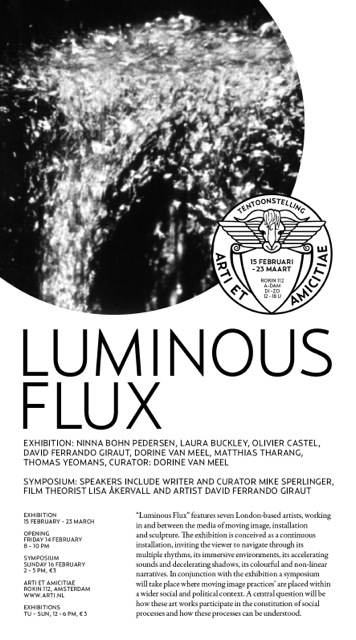Don’t miss this week the upcoming exhibition Luminous Flux at Arti et Amicitiae. The Private View is on Friday 14 February from 8 – 10. They have also organised a symposium on video art, new media and the changing status of the image after the internet on Sunday 16 February from 2 – 5 pm. See the full program of the Symposium below.:
Exhibition 15 February – 23 March
Open every Tuesday – Sunday from 12 till 6p
RSVP – limited seating
ARTIST DAVID FERRANDO GIRAUT: “ANTI-RUIN: CONTEMPORARY ART, DIGITAL IMAGE AND POLITICAL AGENCY”
What strategies are to be used, from the field of visual arts, in order to effectively give visibility to the often self-obfuscating processes – socio-political, economical, cultural, technological, ecological, etc. – that shape contemporary reality? How can the new possibilities – aesthetic and ontological – offered by digital image be applied to such aim, as a tool for political agency?
David Ferrando Giraut is an artist/filmmaker based in London. He is currently a PhD candidate at Goldsmiths College. His work deals with the interweaving of time and images, of nature and culture; with transversality and the ruin. He graduated from an MFA in Goldsmiths College in 2008 and, more recently, took part in the LUX Associate Artists Programme, London. Among his recent exhibitions and screenings are: “Veraneantes” MARCO, Vigo (2013); “It´s a Place of Force”, part of REMAP4, Athens, (2013); MACO 2013, Mexico City; ARCOmadrid 2013; “Cristalino”, Galería Bacelos, Madrid and Vigo (2012); 41 International Film Festival Rotterdam (2012); “Swollen Jungle”, Union Gallery, London (2012); “The Fanstasist”, MACUF, A Coruña (2011).
FILM THEORIST LISA ÅKERWALL: “POST-INTERNET AND PRE-HOTEL: A CRITICAL POST-CINEMATIC AESTHETICS”
This talk analyses post-cinematic aesthetic strategies such as the multiplication of perspectives and the manifestation of networked selves, as well as caricatured styles of speech, movement, and accelerated montage. Through this analysis Åkervall will show how post-cinematic video installations provide an affective cartography of early twenty-first century experience. The post-cinematic is not exclusively a function of screens or media, but can rather also be registered in changed relations to language, (self-)perception, and social relations incontemporary life. This examination of post-cinematic video installations offers clues for the description and analysis of the space of networks and flows characteristic of neo-liberal societies of control.
Lisa Åkervall is a postdoctoral Research Fellow at the Department of Film Studies at the Free University Berlin and a member of the Collaborative Research Center “Aesthetic Experience and the Dissolution of Artistic Limits.” She defended her dissertation “Becoming Visionary: A Pedagogy of Perception in Cinema” at the Free University Berlin in 2012. Her publications in English include: “Cinema, Affect and Vision” (in: Rhizomes 16. Special Issue: Deleuze and Film, 2008 http://www.rhizomes.net/issue16/akervall.html) and “Character-Witness, Actor- Medium” (in: Acting and Performance in Moving Image Culture. Bodies, Screens, and Renderings, 2012).
CURATOR AND WRITER MIKE SPERLINGER IN CONVERSATION WITH THE ARTISTS NINNA BOHN PEDERSEN, OLVER CASTEL, DORINE VAN MEEL AND THOMAS YEOMANS:
Mike Sperlinger is currently Professor of Writing and Theory at the Oslo Academy of Art. He was formerly the assistant director of LUX (www.lux.org.uk), a London-based agency for artists working with the moving image, where he worked for more than a decade. He has written for publications including Afterall, Art Monthly,Dot Dot Dot, Frieze, Radical Philosophy and Texte zur Kunst, and has edited books on early conceptual art and the idea of artists’ cinema.
(Arti et Amicitiae, Rokin 112, Amsterdam, www.arti.nl)



